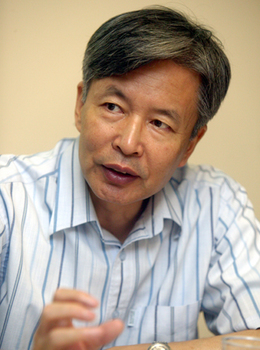 |
Joint growth pursues both growth and distribution. Joint growth has as its target the growth of big companies as well as small and medium-sized companies, while promoting an income increase for the rich as well as the poor. It is a timely policy direction, because all sectors of society can benefit, and a synergy will come from its results. Conservative pundits, opposition parties, and the media have a bad habit of thinking that a more even wealth distribution is an enemy of growth. This habit demonstrates the pattern that knowledge, once inputted, dominates a brain for a long time, as Keynes said. These groups have often accused the participatory government of losing growth potential by focusing on distribution, but they have no evidence of their claims. Hit by unceasing opposition from the conservative forces, the participatory government could not focus on distribution and participation, spurring an insufficiency in growth potential. People’s attention is being paid on the South Korea-U.S. free trade agreement (FTA). The government has stressed that the opening of markets and increased international competition are the only ways for the South Korean economy to survive in the era of globalization. What is more remarkable, however, is that the South Korea-U.S. FTA is fundamentally different from FTAs with other nations. Unlike with other nations, the U.S. demands economic consolidation with the signing of this FTA, which would prompt a change in economic structure. Opposing the South Korea-U.S. FTA is not a matter of simple exclusionism or class selfishness. The impact of such an agreement would be enormous: the South Korea-U.S. FTA is a matter of fundamentally changing our economic structure. In the face of the 1997 financial crisis, South Korea underwent an American-style restructuring, advised by the International Monetary Fund, the U.S. Treasury Department, and Wall Street. Side effects from the American-style restructuring still linger. Low investment and low growth at this stage are part of them. A South Korea-U.S. FTA will make such side effects permanent and socioeconomic polarization will eventually deepen. The market economic system has various forms, including the U.K.-U.S. type and the Northern European type. The former, a market-first ideology, is not the best option. Why is South Korea trying to weaken its economic structure by giving up its policy sovereignty? FTAs should be encouraged, but South Korea must sort out its counterparts. The participatory government should handle economic policy as planned during its remaining tenure. It is not a matter of choice between pragmatism and reform, so the government must focus on both pragmatism and reform. It is not a matter of choice between distribution and growth, so the government must focus on both distribution and growth. By not sticking to the pursuit of superficial popularity, I hope the government will lay down the cornerstone for a healthy nation in the long-term view.






